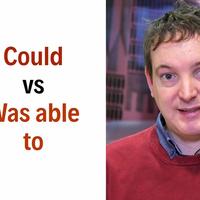Could vs Was able to - English In A Minute - YouTube
Could vs. Was able to - English In A Minute - YouTube
Could vs Was able to - Inglés en un minuto - YouTube
Could vs Was able to - English In A Minute - YouTube
Could vs Was able to - Angielski w minutę - YouTube
Could vs Was able to - Inglês num minuto - YouTube
Could vs Was able to - English In A Minute - YouTube
Could vs Was able to - Bir Dakikada İngilizce - YouTube
Could vs Was able to - Англійська за хвилину - YouTube
可以 vs 能够 - 一分钟英语 - YouTube
可以 vs 能夠 - 一分鐘英語 - YouTube
When do we use 'could' and 'was able to' to talk about past abilities?
Khi nào chúng ta sử dụng 'could' và 'was could' để nói về những khả năng trong quá khứ?
If it's a positive sentence, ask yourself if it's a general ability - which uses 'could', or a specific achievement - which usually uses 'was able to'.
Nếu đó là một câu tích cực, hãy tự hỏi liệu đó là một khả năng chung - sử dụng 'có thể' hay một thành tích cụ thể - thường sử dụng 'có thể'.
'I could run fast when I was younger.'
'Tôi có thể chạy nhanh khi tôi còn trẻ.'
'I was able to win a medal.'
'Tôi đã có thể giành được huy chương.'
But we do use 'could' for a specific event, if we use verbs related to senses or thought processes.
Nhưng chúng ta sử dụng 'could' cho một sự kiện cụ thể, nếu chúng ta sử dụng các động từ liên quan đến giác quan hoặc quá trình suy nghĩ.
'I could feel the wind in my face.'
'Tôi có thể cảm thấy gió phả vào mặt mình.'
'I could remember my coach's advice.'
'Tôi có thể nhớ lời khuyên của huấn luyện viên của tôi.'
If the sentence is negative, it's much easier – we can use either.
Nếu câu ở dạng phủ định thì dễ hơn nhiều – chúng ta có thể sử dụng cả hai.
'I couldn't do much at school the next day.'
'Tôi không thể làm được gì nhiều ở trường vào ngày hôm sau.'
'I wasn't able to concentrate at all!'
'Tôi không thể tập trung chút nào!'
Negative or positive? Specific or general?
Tiêu cực hay tích cực? Cụ thể hay chung chung?
Are there any senses or thought processes?
Có giác quan hay quá trình suy nghĩ nào không?
'What could you do when you were younger?'
'Bạn có thể làm gì khi còn trẻ?'
'What were you able to achieve?'
'Bạn đã đạt được điều gì?'
'What could you see or hear while you were doing it?'
'Bạn có thể nhìn thấy hoặc nghe thấy gì khi làm việc đó?'

